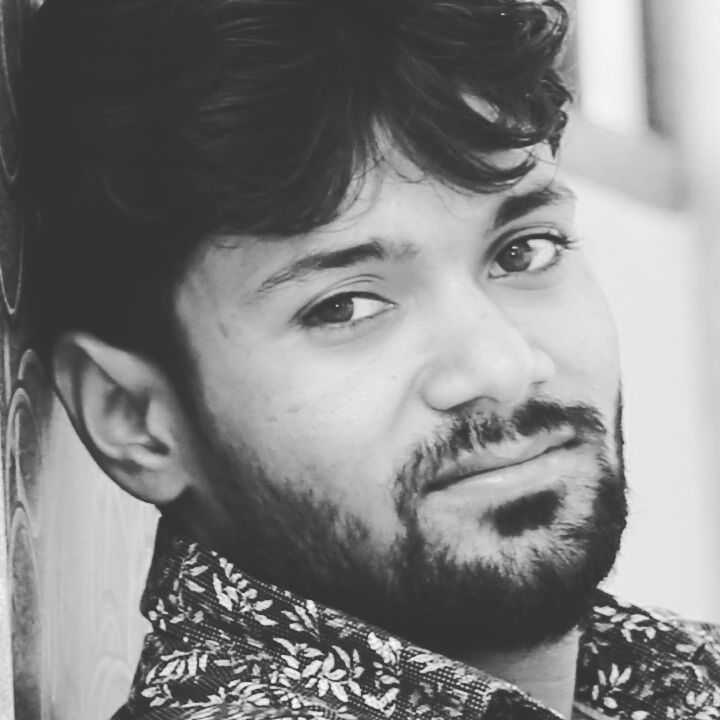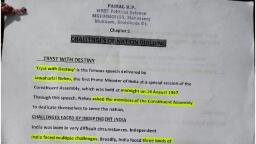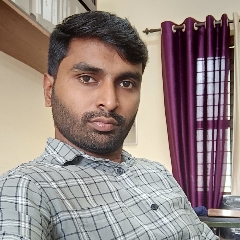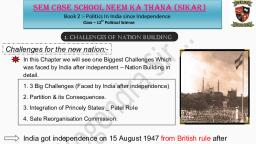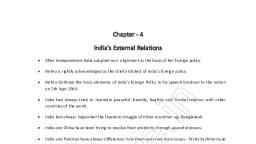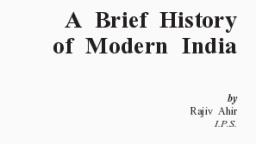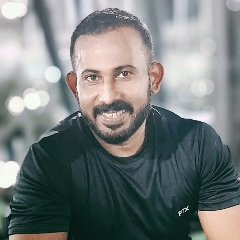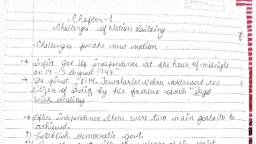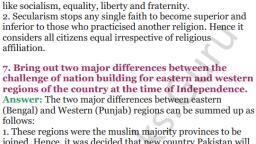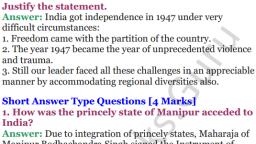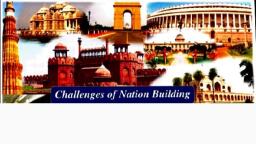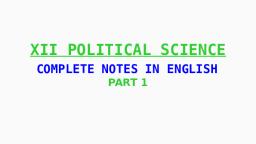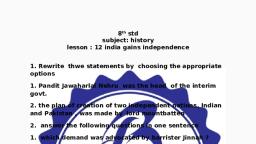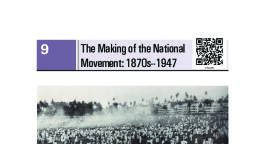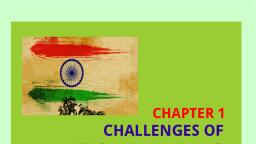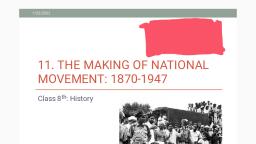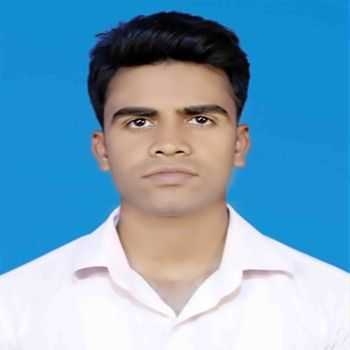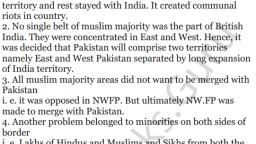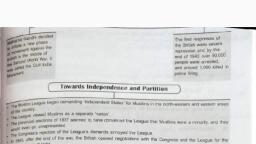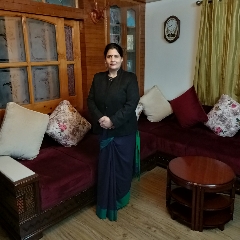Page 1 :
SEM CBSE SCHOOL NEEM KA THANA (SIKAR), Book 2 :- Politics In India since Independence, Class – 12th Political Science, , 1. challenges of nation building, , Challenges for the new nation:In this Chapter we will see one Biggest Challenges Which, was faced by India after independent – Nation Building in, detail., 1. 3 Big Challenges (Faced by India after independence), 2. Partition & its Consequences., 3. Integration of Princely States _ Patel Role, 4. Sate Reorganisation Commission., , India got independence on 15 August 1947 from British rule after, a Huge Struggle., After Independence India Faced Many Challenges, Out of All 3, was Major Challenges for India let’s see one by one:1
Page 2 :
At the hour of mid-night on 14-15 August 1947, India attained independence., Jawaharlal Nehru, the first Prime Minister of free India, addressed a special, session of the Constituent Assembly that night., This was the famous ‘tryst with destiny’ speech that you are familiar with., This was the moment Indians had been waiting for., There were Two main goals almost everyone agreed upon :1. That after Independence, we shall run our country through democratic government., 2. That the government will be run for the good of all, particularly the poor and the socially disadvantaged groups., Note:- Now that the country was independent, the time had come to realise the promise of freedom., , 1, , Nation Building was a challenge for India due to two reasons:-, , In India there were Huge Diversity,, People spoke many Language, Follow, Different Religions & Customs, and so, to serve the interest of all was the big, Challenge., , Mountbatten Plan gave choice to, Princely States either Join India or, Pakistan or Remain Independent. So, it was India’s Challenge to Shape a, good Nation., 2
Page 3 :
2, , Establish Democracy, , Before Independence India Leaders wanted Democracy in India after, Independence. So it was very Tough Task to establish democracy which will run, According to constitution in such a poor & illiterate country. But we proved this, by establishing a Successful democracy., 3, , Economic Development, , As you will know at the time of independence there were Huge Economic Crisis, in India such as Poverty, illiteracy and inflation so to remove all these was a big, Challenge for India., , Partition: displacement and rehabilitation, Due to Two Nation Theory of Muhammad Ali Jinnah (Leader of the Muslim league & Founder of, Pakistan)., India was divided into 2 parts India & Pakistan. So here we have to Study the Process of Partition & its, Results (Consequences)., Two Nation Theory: - According to two nation theory the India Consisted of 2 Country – India & Pakistan., This Theory was give by Jinnah (Leader of Muslim League)., 3
Page 4 :
Process of Partition, Obviously, The Partition of India was done on the Basis of Religious Majorities., Hindu majority areas were with India &, Muslim Majority areas were, ere joined with Pakistan. But, There were many problems related to the process of Partition:1. There was No one area that have Muslim in Majority. But, There were many areas where Muslim were in majority. So it means “ Many Pieces would, done of India “ But Punjab (west)) & Bengal (East) :- East Pakistan & West Pakistan, 2. Some Muslim Majority area Leader such as Khan Gaffar Khan (Leader of North West Frontier, Province) Do Not Wanted to go with Pak., 3. The two big Muslim majority areas were also have Hindu & Sikh, Population so they were (Bengal & Punjab) were also divided into 2, parts., , 4
Page 5 :
Consequences of Partition, There were many Bad results of partition some are :1. Large scale killing of people., 2. Cities such as Lahore, Kolkata, Amritsar were converted into, Communal zones., 3. People were forced to leave their home. They have to travel large, distance by foot., 4. Women’s were Killed, Raped or forced to Marry., 5. Children loss their parents., 6. People have to live in Refugee camps., 7. Sometime family head killed his family members & themselves to, preserve family honour., 8. People were Forced to converts their Religion several poets &, writers described partition as a “ Division of Hearts.”, 5
Page 6 :
9. It is estimated that the Partition forced, about 80 lakh people to migrate across, the new border., 10. Between five to ten lakh people were, killed in Partition related violence, violence., Note:- The Muslim population in India accounted for 12 percent, per, of the, total population in 1951., So, how would the government of India treat its Muslim citizens and other, religious minorities (Sikhs, Christians, Jains, Buddhists, Parsis and Jews)?, , 6
Page 7 :
Mahatma Gandhi’s sacrifice, , 02 Oct 1869 to 30 Jan 1948, , On the 15th August 1947 Mahatma Gandhi did not participate in any of the Independence Day celebrations., He was in Kolkata in the areas which were torn by gruesome riots between Hindus and Muslims., He was saddened by the communal violence and disheartened that the principles of ahimsa (non-violence), violence) and satyagraha (active but, non-violent resistance) that he had lived and worked for,, Had failed to bind the people in troubled times., Gandhiji went on to persuade the Hindus and Muslims to give up violence., His presence in Kolkata greatly improved the situation, situation, and the coming of independence was celebrated in a spirit of communal harmony, with, joyous dancing in the streets., Gandhiji’s prayer meetings attracted large crowds., But this was short lived as riots between Hindus and Muslims erupted once again and Gandhiji had to resort to a fast to bring peace., Next month Gandhiji moved to Delhi where large scale violence had erupted., He was deeply concerned about ensuring that Muslims should be allowed to stay in India with dignity, as equal citizens., He was also concerned about the relations between India and Pakistan., He was unhappy with what he saw as the Indian government’s decision not to honour its financiall commitments to Pakistan., He undertook what turned out to be his last fast in January 1948., As in Kolkata, his fast had a dramatic effect in Delhi., Communal tension and violence reduced., Muslims of Delhi and surrounding areas could safely return to their homes., The Government of India agreed to give Pakistan its dues, dues., Extremists in both the communities blamed him for their conditions, conditions., He was particularly disliked by those who wanted Hindus to take revenge or who wanted India to become a country for the Hindus, just as, Pakistan was for Muslims., 7, They accused Gandhiji of acting in the interests of the Muslims and Pakistan.
